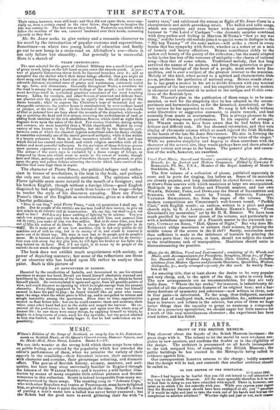MUSIC.
Wilson's Edition of the Songs of Scotland, as sung by him in his Entertainments on Scottish Music, at the Queen's Concert-rooms, Hanover Square, and the Music-Hall, Store Street, London. Books I.—IV.
Wm can little wonder at the strong hold which these songs have taken on public feeling, as evinced by the popularity which has attended the editor's performance of them, when we perceive the variety of their appeals to the sensibility—their historical interest, their associations with character and costume, their picturesque colouring, and dramatic effect. The genius of Scottish history, scenery, manners, and antiquities, has been long since universally familiar in England through the labours of Sir WALTEasScorr ; and it receives a still further illustration by means of many exquisite little cabinet pictures and fireside romances in this collection. Sccrrr is indeed inseparable from many memories revived by these songs. The taunting song to "Johnnie Cope," who with other Royalists was beaten at Prestonpaus, must have delighted him, so glowingly does it paint the triumph of the time. Falstaff's threat of putting a man's name into a ballad was never better executed ; but the Rebels had the good taste to avoid gibbeting their foe with "a scurvy tune," and celebrated the retreat or flight of Sir JoEN COPE in a characteristic and mirth. provoking strain. The ballad and table songs, which are complete and even better without accompaniment—the humour in "the Laird o' Cockpen "—the dramatic surprise combined with deep pathos and feeling in HECTOR M'NEILL's "Saw ye my wee thing," and the lovely old melody joined to quaint verse in dialogue in the "My boy Tammy" of the same author—will strike a chord in every bosom that has sympathy with SCOTT, whether as a writer or as a man of homely and hearty affections. BURNS contributes richly to the pathos and beauty of the poetry of the collection ; but the music adapted to his lyrics has less of the romance of antiquity—the charm of national song—than that of some others. Traditional melody, that has long survived the names of its authors, and hung from generation to generation on the beatings of the heart of a people, must needs have fine qualities, and is ever a subject of the greatest interest to the musician. Melody of this kind, when united to a spirited and characteristic little poem, produces the perfection of national song. BURNS stands alone: he is too great a master in his art to divide honours with any musical compatriot of the last century ; and his exquisite lyrics are too modern in character and sentiment to be united to the antique and Gothic creations of the Scottish lyre. Mr. WILSON'S plan in the publication of these songs is to be commended, as well for the simplicity that he has adopted in the accompaniment and harmonization, as for the historical, anecdotical, or literary notices he has appended to each. No song is left wholly without some illustrative or suggestive comment, to excite remark, and lead naturally from music to conversation. This is always pleasant in the pauses of drawing-room performance. In his capacity of arranger, Mr. WILsoN seems to have been aware that he had before him a delicate and difficult task. He has shunned ostentation, and that yain display of chromatic science which so much injured the Irish Melodies in the hands of the late Sir Jortic STEVENSON. His aim in forming the accompaniments, he says, has been "to support the voice of the singer." While we perceive simplicity and keeping in them accordant with the character of the several airs, they would perhaps here and there admit of greater variety and scope in the basses. The general plan and execution of the work, however, are excellent.


























 Previous page
Previous page